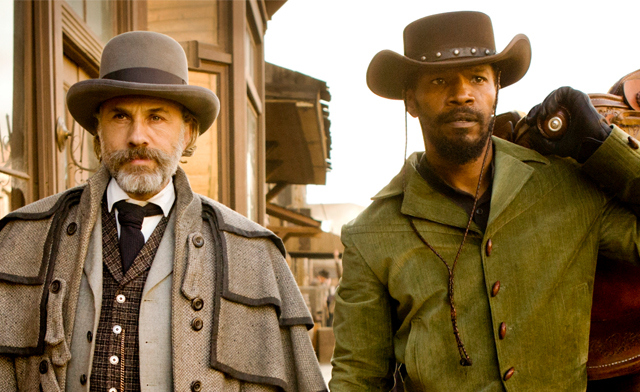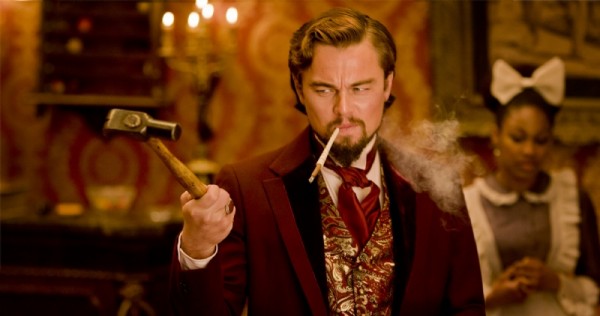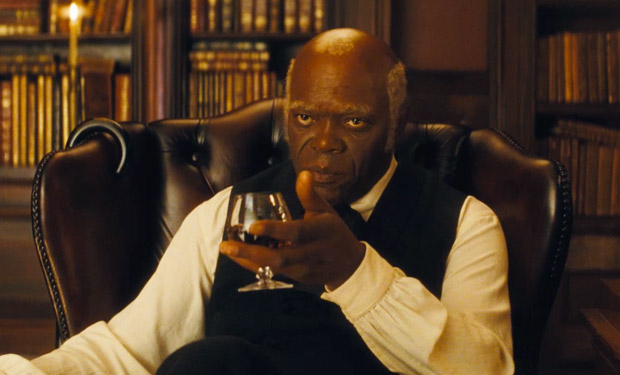|
In Texas,
1858, a dentist turned bounty hunter named Dr. King Schultz (Christoph
Waltz)
is seeking the whereabouts of a gang known as the Brittle Brothers. To
find
them he frees Django (Jamie Foxx), a slave who knows who the men are.
Travelling across the South together, the two men form a partnership,
with
Schultz teaching the former slave the skills of a bounty hunter. In
exchange
for hunting the Brittle Brothers, Schultz agrees to help locate and
free
Django's wife Broomhilda (Kerry Washington), who is still in captivity.
She is
a servant to a powerful slave trader, the courteous but untrustworthy
Calvin
Candie (Leonardo DiCaprio). He runs a plantation called Candie Land,
where
slaves are encouraged to fight each other. Django and Schultz must
pretend to
be interested in buying a slave-fighter so that they can also bargain
for Broomhilda's
freedom. One of Candie's loyal slaves Stephen (Samuel L. Jackson)
remains
suspicious of their new guests.
Django Unchained is the
film where Quentin Tarantino finally grew up. The former video store
clerk
turned director, fifty next year, is showing signs he's ready to put
his film
geek senses aside and start substantiating his work. Django
surprises because Tarantino has pared back the pop
references, the verboseness and the juvenility that marks much of his
work. The
man who once said "violence is one of the most fun things to watch"
now has something important to say about the way that killers and
violence are
manufactured. If this isn't shocking enough, the film is also his most
compassionate and romantic work since Kill
Bill Vol. 2 (2004), with characters who finally have something
internal resembling
genuine feelings.

Having
imitated a number of popular film genres, Tarantino has longed to make
a proper
Western, a tribute to his hero Sergio Leone. He once named The
Good the Bad and the Ugly (1966) as his favourite
film and like that movie, or any great Western,
there is a wealth of commentary on justified
violence here. However, the strength of Django
is that it doesn't merely mimic Leone's work but provides new insights
into the
way that murder was deemed a necessity in the American West and the
price of
human life. Tarantino uses comedy to
address this troubling subject matter, transcending its absurdity and
brutality
in unique ways we have not seen before.
Schultz's
introduction is fantastic. He is richly characterised, not as a cold
blooded
psychopath, but as a businessman. After shooting a slave owner off his
horse,
Schultz puts down his rifle and then asks if he can have a bill of sale
for
Django. Later he explains: "I kill people and sell corpses for cash".
Every kill to him is a business deal. He only kills people if he has
the right
paperwork for the bounty and believes he is acting within the confines
of the
law. Christoph Waltz is perfect in this role. He strips away any hint
of malice
and replaces it with a hilarious amount of gentility that makes him
seem almost
naive to the seriousness of his actions.

Interestingly,
this character also shows changes that make him seem like a rounded
human being;
something unique to any Tarantino film. Schultz's friendship with
Django makes
him feel more responsible for other people, not just for freeing this
one
slave, but seeing how other people kill for entertainment, including a
vicious
dog attack on a slave. Django, quietly expressive by a great Jamie Foxx
performance, also faces powerful moral questions about the value of
life and
race. Brief intercuts to memories of his wife increase the film's
romantic
temperament but later test his moral grounds. To fool Candie, Django
must act like a slave trader and be
neglectful of slaves himself. Both protagonists are therefore asked how
much
they're willing to sell themselves morally
for flesh - a complex allegory for slavery itself.
The
Candie Land scenes reach tension levels on par with Inglourious
Basterds (2009). Infrequent close-up shots on Django's
face and on his revolver are hugely suspenseful touches. Both DiCaprio
and
Samuel L. Jackson also form a pair of scene stealing baddies of
frightening
unpredictability, and build a chilling mirror to Schultz and Django's
own
friendship. There is an artifice to their civility,
reflected through the art direction and mise en scène. The rooms of the
main
house are handsomely lit by candlelight and furnished with leather
fittings. A
woman plays Beethoven on a harp and we watch the slaves set out
placements on
the main dining table. But the unspoken psychological dilemma remains:
do all
of these luxuries come at the expense of a pound of flesh? This
question is
visualised with perhaps the most dramatic Faustian-like handshake in
the
history of movies.

For all
the depth of the screenplay and the amazing performances, there are
niggling shortcomings.
Some technical issues include Tarantino's overly playful editing cuts
and an
anachronistic soundtrack, using songs from the likes of Tupac. The last
fifteen
minutes are also disastrous. The old Tarantino emerges with silly
shootouts and
an extremely stupid, unfunny cameo, a supposed gift to Australia. God
help us. These
are distractions from a very mature theme: no matter what their skin
colour,
all killers become indistinguishable from one another. Nonetheless,
discussing
an imperfect Tarantino film is still better than saying nothing at all.
|